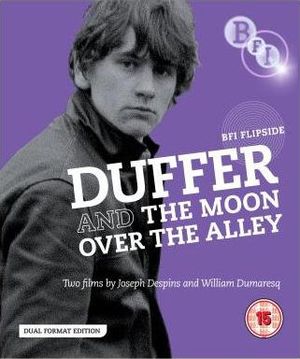Duffer
The sleeve notes for the DVD of a 1971 film Duffer
“An intense and bizarre study of obsession that is by turns lyrical and disconcerting, Duffer tells the deranged story of a teenage boy torn between the womanly charms of a kindly prostitute, and the relentless, sadistic attentions of an older man.”
say that Delia provided sound effects for it:
From its running voice-over to the weird, artificial background tape-loops of passing traffic, the entire Duffer soundtrack is a piece of sound art, combining MacDermot's compositions with more avant'garde interventions, such as the acrid, Ligeti-like high-string dissonances when Louis Jack is draping worms on Duffer's stomach, or the ghastly Moog synthesizer buzz that flares up when Duffer spies Your Gracie entertaining a client.[1]
Also riding high at the time was composer Galt MacDermot, whose career in musical theatre reached its peak in 1967 with the controversial hit, Hair. MacDermot, a friend of Dumaresq's, contributes a smattering of musical interludes for piano which greatly assist the film's trajectory from downbeat weirdness to fragile charm, concluding with a mournful nocturne that almost succeeds in making the South Bank's concrete architecture (where the final scenes were shot) sing with a sweet ache of sorrow and resignation. Add to this some electronic contributions from the BBC Radiophonic Workshop's celebrated Delia Derbyshire, working off-the-record here, and you have a soundtrack that graces every beat of a complex emotional journey, rounding off a truly accomplished debut feature.[1]
There were certain night scenes where I felt the new synthesizer machine at the BBC Radiophonic Workshop would be effective. Radiophonics supplied several effects which I laid over the appropriate sequences; they worked extremely well.[1]
Sounds of rushing wind and electronic howls dominate the scene, part of a very experimental sound collage that includes the rantings of Louis Jack and the electronica (momentarily simulating traffic in one scene - four years before Kraftwerk would turn such sounds into a new form of pop) of the BBC Radiophonic Workshop's Delia Derbyshire.[2]
Credits
- Writer: William Dumaresq
- Directors: William Dumaresq and Joseph Despins
- Music: Galt MacDermot
- Sound effects: BBC Radiophonic Workshop
Tracks
- Descending monkey (14:26-14:50)
"There was this monkey on a stick yhat Your Gracie had, and when I piled into her she'd start it. The idea was that the monkey should get to the bottom before I was finished but I never could somehow last long enough. I tried, God knows!"

- Draping worms (18:08-20:06)
DUffer's male lover covers him in worms to make a film.

- Betrayed (41:19-42:15)
Duffer sees his female lover in the arms of another man.

Availability
- Released on DVD on 17th January 2011 as part of the British Film Institute's "Flipside" series.
- The DVD of the film can be bought from the British Film Institute's filmstore, Amazon, MovieMail, Speedy Hen and play.com
- File:Duffer.torrent
External links
- A detailed article about the film's producers and plot, though with no mention of Delia.
- The IMDb entry for Duffer
References
- ↑ 1.0 1.1 1.2 DVD sleeve notes by Stephen Thrower.
- ↑ Frank Collins on Cathode Ray Tube.
